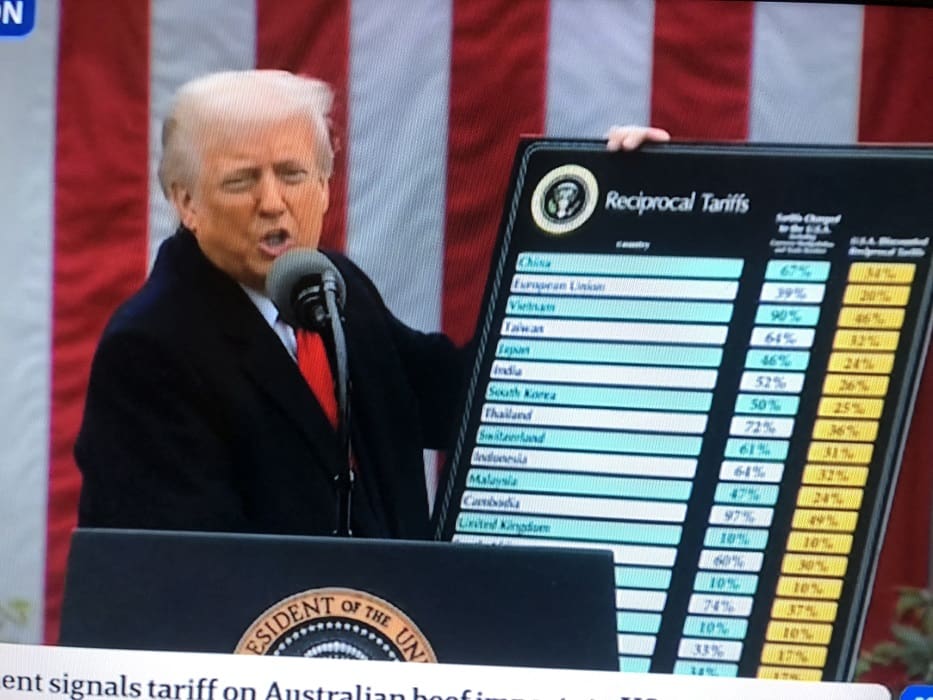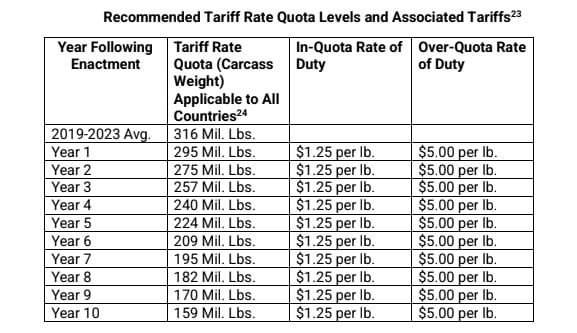
Donald Trump with his list of countries, including Australia, to be hit with reciprocal tariffs.
GLOBAL demand for sheep meat and animal protein generally is expected to mute the impact on Australian lamb producers of the 10 percent tariff on American imports announced by US president Donald Trump today.
And although the tariff has been welcomed by US lamb producers, Sheep Central has been told it is well below what was requested and they will monitor its impact on pricing, import volumes and domestic production.
In his ‘Liberation Day’ speech today, Mr Trump announced has announced tariffs as high as 25pc on car imports, reciprocal tariffs on several countries and a baseline tariff of 10pc products that is expected to be levied on Australian beef, sheep and goat meat.
Although Mr Trump only made mention of Australia not accepting US fresh beef imports due to its biosecurity rules, the Australia’s beef, sheep and goat meat sectors are today assuming its US imports will be levied with a 10pc tariff from 5 April or Wednesday next week.
Major Australian processors said they had no comment or were still analysing the new tariff regimen with their US teams.
Global AgriTrends analyst Simon Quilty said the tariff would affect the heavy lamb market in Australia, which makes up 18pc of Australia’s lamb production, but he expected the influence to be short-term and mild.
“So it’s a small part of the market in one respect.”
He expected the areas to be impacted the most will be the heavy lamb cuts currently sold into the US that it would be difficult to market elsewhere globally.
“So that is lamb racks which make up 47pc of the market, shortloins 70pc and legs, 44pc of our global sales go to America.”
Mr Quilty estimated that about 40pc of the heavy lamb product and cuts that go to America would “challenged” by the 10pc tariff and “take it on the chin.”
“But when you do all the numbers it is not a big impact on pricing and I think the lack of supply this year – the expected 3 million lambs less to be processed — the influence of lack of supply will far outweigh any of these tariff influences on heavy lambs.”
“I see overall that we will potentially have a short-term impact but also keep in mind the heavy tariffs, the counter tariffs that will be imposed on them.”
He said Australia and New Zealand were the dominant global sheep meat exporters, with little US exports.
“But nonetheless I think protein (demand) and the lack of influence of US exports of pork, chicken and beef could see a tightening or further price rise on protein globally, which lamb will be a beneficiary of.
“So overall protein prices to go higher due to these tariffs.”
Mr Quilty said if there was a mild correction in lamb prices this week, he expected within a month prices will be higher than what they are today.
“The (lamb) market in the US might be short bought at the moment, but I am expecting that to lift as a result because there has been this reluctance in the last month to two months to get too far forward (in purchasing).
“So I think some of that summer buying that we get, that seasonal lift, that there is still pent-up demand there (in the US).”
Mr Quilty said it must be kept in mind that there have been increases in imported lamb prices across the board in the US.
“Lamb shanks are up 23pc, lamb legs up 15pc, lamb shoulders up 17pc and racks are up 9pc.
“The big winner is lamb mince, up 20pc, both in volume and in sales,” he said.
“I would say that demand is exceptionally good and that this may have a very mild short-term impact for this but in a month’s time prices will be trading at higher levels than they are today.”
Australian marketer of premium high marbling lamb in the United States, Tom Bull, said the 10pc tariff is not ideal “but not game changing.”
“Other markets will be increasingly attractive but we see the USA as still a significant opportunity for highly marbled lamb.
“The domestic beef shortage and subsequent price rise for beef will make any price rises at retail for lamb easier to absorb,” he said.
R-CALF leader suggests a higher tariff might be called for
R-CALF USA chief executive officer Bill Bullard told Sheep Central today that the body is thankful for the tariffs Mr Trump announced today.
“We’ve been asking for more as indicated in the attached document.
“We’ll evaluate the potential effects of what was just announced and will determine at a later date what TRQ and tariff levels might still be needed to reverse the alarming decline of our domestic sheep industry,” he said.
Sheep Central earlier this month reported that R-CALF had recommended president Donald Trump apply tariffs of US$1.25/lb, or around 30 percent, be applied to all imported lamb and sheep meat. As can be seen from R-CALF’s ‘Submission for America First Trade Policy’ submission, it had recommended that tariff rates should double to an over-quota rate of US$5/lb, or equivalent to about 120 percent when sheep meat imports exceed certain arbitrary quota levels.

Industry disappointed at tariff decision – RMAC
The Red Meat Advisory Council and its members, including Sheep Producers Australia, issued a statement that they were disappointed in the United States’ decision to impose tariffs on Australian red meat exports destined for the US.
RMAC chair John McKillop said the decision to impose a 10pc tariff on goods imported to the US failed to recognise that Australian red meat contributes to stable food supplies and prices in the United States.
“While Australian meat exports will shortly be subjected to a 10% tariff, there is no ban on Australian red meat and our trade with the US will continue.
“However, it remains a disappointing decision from the US, in stark contrast to our 20-year partnership under the Australia-United States Free Trade Agreement (AUSFTA),” Mr McKillop said.
“For industries like lamb and goat, Australian product ensures stability of supply and services local demand that cannot be met domestically.
“In addition, imported lamb and goat meat help sustain, or even expand, consumer demand for these products, ensuring that American producers will stand to gain as more consumers become interested in lamb and goat,” he said.
RMAC said domestic lamb production increased by 3pc in the US in 2024, and further growth is expected in 2025 and 2026 due to rising lamb inventories. Per capita lamb consumption in 2024 was estimated at 671 grams per person, a 57pc increase from 2011 levels.
In 2024, Australia exported $5.7 billion worth of red meat to the United States. This included 394,716 tonnes of beef worth $4.16 billion, 104,210 tonnes of sheep meat worth $1.35 billion and 22,559 tonnes of goat meat worth $188.5 million.
National Farmers Federation president David Jochinke said the tariff decision is a disappointing step backward for Australia and the United States and for the global economy.
Mr Jochinke said he spoke with Prime Minister Anthony Albanese this morning, outlining that the sector does not support the introduction of reciprocal tariffs and supports the government in standing firm in defence of Australia’s science-based biosecurity framework.
“The Australian agricultural industry supports a considered and measured approach to negotiations with the United States and will work closely with the Government and all sides of politics to seek a resolution to this issue.”
“While this decision creates unnecessary uncertainty, we remain confident in the strength of Australian agriculture.
“Our products are sought after worldwide for their quality, sustainability, and reliability,” he said.
Australia proudly contributing to consistent US lamb supply – SPA
SPA chief executive Bonnie Skinner said tariffs undermine the Australia- United States Free Trade Agreement (AUSFTA) and fail to acknowledge the vital role that Australian product plays in underpinning the growing appetite for lamb in the US.
“Australian lamb producers are proud to make a contribution to ensuring consistent supply to the US,” she said.
“Lamb is synonymous with Australia – and for good reason. Our producers are the backbone of a supply chain which delivers high quality sheep meat products throughout the world.
“SPA has a long history of collaboration with the American sheep industry, and the sector shares the ambition to get as much lamb on as many dinner plates as possible,” Ms Skinner said.
“According to Steiner analysis, lamb imports rose 28pc in 2024 while domestic production also grew by 3pc, showing the domestic market can grow alongside imports.
“In addition, tariffs don’t reflect the 20-year partnership under the Australia-United States Free Trade Agreement (AUSFTA),” she said.
“SPA is disappointed with the 10 per cent tariff and will continue to work with the Red Meat Advisory Council (RMAC) and service providers including Meat & Livestock Australia and government to support the industry to deal with changes to the trading arrangement with the US.”
MLA focus on access to other global markets
Meat & Livestock Australia managing director Michael Crowley said that MLA and the industry had already been working on this issue throughout 2025 with the formation of an industry taskforce and collaboration and communication with the Australian Government.
He said that the role of MLA was to grow global demand for our beef, sheep meat and goat meat by:
supporting improved access to global markets
developing more markets alongside commercial partners
promoting Australian red meat’s strong attributes as a guaranteed safe, healthy and delicious product
creating demand with high impact in-country marketing campaigns.
“US tariffs will impact the prices paid by American families and may have flow on impacts on the supply chain,” he said.
“It is unlikely these changes will make a difference to retail prices here in Australia,” Mr Crowley said.
Not the actions of a friend of Australia – Albanese
During a press conference immediately after Mr Trump’s announcement, Australian Prime Minister Anthony Albanese fired off a strongly worded response, saying if President Trump’s actions were indeed ‘reciprocal’, then the tariff level would be zero.
“This is not the act of friend,” the Prime Minister said.
During the early stages of Trump’s long, often rambling delivery this morning, he singled out Australian beef for mention, saying Australians were wonderful people, “but they banned American beef – yet we imported US$3 billion worth of Australian beef last year alone.”
“They won’t take any of our beef – they don’t want it – because they don’t want it to affect their farmers.
“I don’t blame them, but we are doing the same thing right now, starting at midnight tonight.”

HAVE YOUR SAY